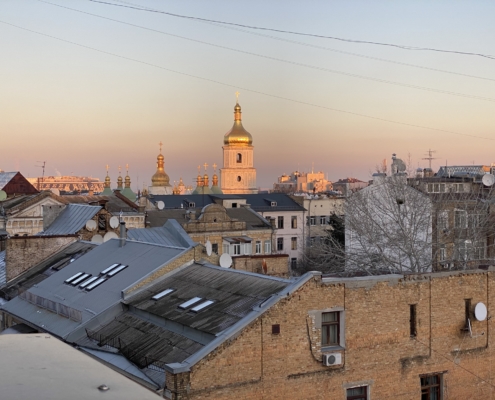Ukrainians, for good reason, have inspired the world. But what makes them so special?
Nothing.
I have been working on democracy and governance programs in Eurasia since 2004, and in Ukraine since 2006. I’ve observed elections and worked on campaigns. As a public opinion research consultant for a variety of clients, I have watched and analyzed hundreds of focus groups over the last five years on topics ranging from the presidential election to LGBTQI rights to pension reform. I have heard ordinary people from every corner of the country describe their frustration and pride in the country’s democratic development. No matter how many grievances they have with their leaders—and they have many—that they vote in fair elections and can speak their minds freely means that Ukraine is a democracy.
It hasn’t always been that way.
In 2004 in what became the Orange Revolution, Ukrainians came to Maidan, in the center of Kyiv, to protest a rigged presidential election. Everyone thought Ukrainians were superhuman then, too. They weren’t. They were just good organizers who believed their democracy was worth fighting for.
The Orange Revolution didn’t happen by accident. It was hard work. Everyone knew the second round of the 2004 Presidential election would be rigged in favor of Viktor Yanukovich, who was the personal choice of term-limited incumbent Leonid Kuchma. Pre-election polls showed Yanukovich was unlikely to win without cheating. When the firehose of state administrative resources was directed toward ensuring a Yanukovich victory, democratic forces (the “Oranges”) stood no chance.
In preparation, throughout 2003 and 2004, Ukrainians worked with closely with the Serbian civil society group Otpor. Otpor had organized the non-violent effort to overthrow Slobodan Milosevic in 2000, a strategy that was based in part in how Poles fought against Martial Law in 1989. Using principals of non-violence laid out in influential texts such as Gene Sharp’s The Politics of Nonviolent Action, leaders of Ukrainian civil society groups like PORA! adapted the lessons to Ukraine’s context.
Activists knew they could use people’s outrage over having their vote stolen as an organizing tool. But they had a lot of work to do.
Every aspect, from the strategic to the tactical, was planned in advance. Pre-election, they had convinced rivals Victor Yushchenko and Yuliia Tymoshenko to campaign as a united front on behalf of the Oranges. Political activists worked to build behind-the-scenes support from legislators, local leaders and even a few oligarchs—those who hadn’t murdered anyone—who could be persuaded to switch sides. Domestic election monitors trained to document and report violations were deployed in every corner of the country. Lawyers strategized how to challenge the violations in the courts, knowing denied petitions would hand them a PR victory. Communications specialists were ready to keep Ukrainians informed about all the ways their votes were stolen. Grassroots organizers used clever tactics—called “softening the ground”—to reduce fear among Ukrainians by showing that a lot of people just like them were fed up too, and ready to take the risk of going to the streets in protest.
When Yanukovich was announced the winner despite election monitors’ reports of widespread fraud and exit polls that showed a clear victory by Yushchenko, the Oranges were ready to mobilize.
Despite the threat of violence, people from around the country came to Maidan. They knew that international and domestic election monitors said the election was neither free nor fair. They weren’t afraid because they saw how many others just like them were facing down police and soldiers. “They can’t shoot everyone” is an operating principle of non-violent protests. Critically, security services refused to shoot protesters, demonstrating the power of non-violence and possible sympathy within the services for the protestors’ message. Under pressure, oligarch-controlled Channel 5 switched sides to tell the truth about the stolen election. Momentum shifted and the Central Election Commission declared a do-over of the election. The compromise candidate few loved but most united behind, Viktor Yushchenko, won.
The Orange Revolution influenced Ukraine’s democratic trajectory in at least two important ways: First, it built the foundation of the civil society which is now supporting the war effort. It taught activists how to unite in broad coalitions, communicate effectively about their goals, and organize people to do the unsexy work of building a sustainable movement. Second, it gave young Ukrainians a deeply rooted sense of their ability to change a government that does not respect the will of the people.
Ukraine stagnated economically and politically in the following years. People became disillusioned with elected leaders who refused to address the issues they cared most about: a poor economy, lack of rule of law and pervasive corruption. Ukrainians hoped President Viktor Yanukovich, who had been legitimately elected in 2010, would keep his promise to sign the parliament-approved EU accession agreement. The agreement would push Ukraine to make the political and economic changes necessary to join in the future. It signalled that Ukraine wanted to take a western trajectory. Even then, a majority of Ukrainians supported it.
Under Kremlin pressure, Yanukovich refused to sign the agreement in November 2013. The country exploded in anger. The Revolution of Dignity—Ukraine’s second revolution in ten years—began.
The organizational foundation built for the Orange Revolution proved solid. The next generation of Ukrainians, who dreamt of a European future, and others who were fed up seeing different rules for the wealthy and well-connected again came to Maidan in the freezing cold. For months, volunteers provided the food, shelter and medical support that made such a large-scale urban protest possible in the middle of winter. To keep spirits up, top Ukrainian entertainers performed and priests held masses in a carnival atmosphere. Everyone knew why they were there: Ukraine’s democracy and European future was at stake.
The protest ended when Yanukovich fled to Russia, but not before snipers opened fire on a crowd of protesters, killing at least 120, and touching off violent street battles. Ukrainian director Sergei Loznitsa’s 2014 documentary Maidan shows the elaborate organization, the sense of common purpose, and the extraordinary violence of the Revolution of Dignity. Much will look familiar to those tuning in to Ukraine for the first time. Ukrainians punch back hard.
The Verkhovna Rada voted to oust the AWOL Yanukovich for failing to show up for work. A caretaker government was formed, which signed the EU accession agreement. Petro Poroshenko was elected with 55 percent of the vote in the May 2014 election.
In between and since the Orange Revolution and The Revolution of Dignity, Ukrainians have pressured their government to crack down on corruption. They’ve involved themselves in the boring machinery of local government by taking advantage of Ukraine’s decentralization policy, which has given local communities more control over budgets. Because of hard work of multiple NGOs that are fighting the battle against Russian disinformation from multiple angles, Ukrainians have become sophisticated consumers of online information. They vote in elections, even if they don’t like their options. It’s taken twenty years to get to this point, but the progress shows every day of this awful war.
Ukrainian democracy often takes two steps forward, one step back. But Ukrainians won’t let their authoritarian neighbor rob them of the democracy they’ve been working on for twenty years. The only thing that has surprised me over the last two weeks is that Putin didn’t know this.
When the war is over, Ukrainians will lead the effort to build democratic institutions in places like Belarus after Lukashenko and post-Putin Russia. They might even have some lessons for Americans and Europeans.
They’re not special. They’re just democrats.


 mitigating or exploiting the divisions becomes easier.
mitigating or exploiting the divisions becomes easier.
 Why should anyone care about the fate of a mid-sized Ukrainian city, pushed up hard against the Russian border?
Why should anyone care about the fate of a mid-sized Ukrainian city, pushed up hard against the Russian border? 